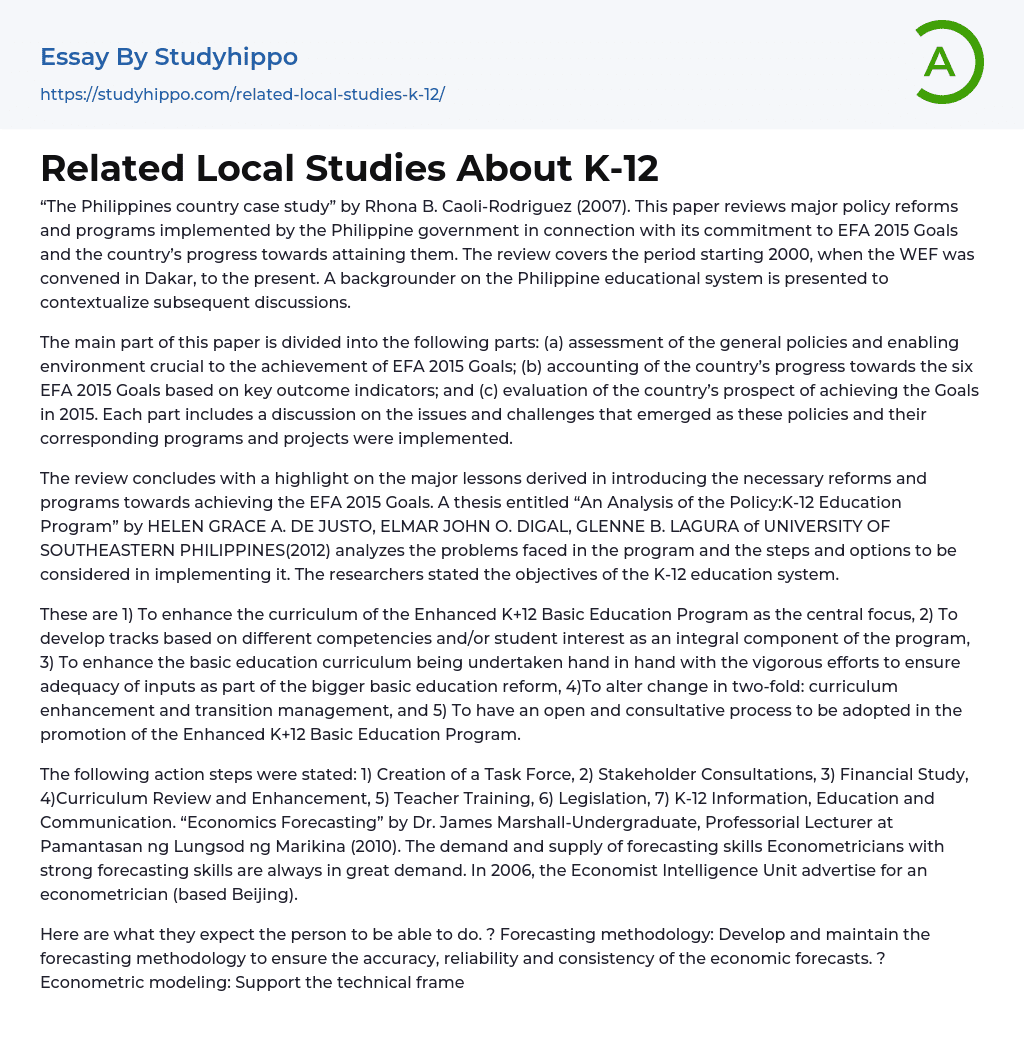"The Philippines country case study" by Rhona B. Caoli-Rodriguez (2007) examines the major policy reforms and programs undertaken by the Philippine government to achieve the Education for All (EFA) 2015 Goals. The study covers the period from 2000, when the WEF was held in Dakar, to the present. To provide a background for further discussions, the paper includes an overview of the Philippine educational system.
The paper is divided into three main parts. The first part is an assessment of the general policies and enabling environment necessary for achieving the EFA 2015 Goals. The second part looks at the country's progress towards the six EFA 2015 Goals using key outcome indicators. The third part evaluates the country's prospects for achieving the Goals by 2015. Each part includes a discussion of the issues and challenges that arose during the implementation of these policies, programs, and projects.
The s
...tudy by HELEN GRACE A. DE JUSTO, ELMAR JOHN O. DIGAL, GLENNE B. LAGURA of UNIVERSITY OF SOUTHEASTERN PHILIPPINES(2012) examines the challenges and strategies in implementing the "K-12 Education Program." The authors express the goals of the program and provide recommendations for its successful execution.
These are the main objectives of the Enhanced K+12 Basic Education Program:
- To enhance the curriculum
- To develop tracks based on different competencies and/or student interest
- To enhance the basic education curriculum
- To alter change in two-fold: curriculum enhancement and transition management
- To have an open and consultative process
The goal is to improve the curriculum and ensure it aligns with the program, offer different tracks for students based on their interests, strengthen the basic education curriculum and reform process, make changes i
both curriculum and transition management, and promote an inclusive and consultative approach to implementing the Enhanced K+12 Basic Education Program.
The following action steps were listed in "Economics Forecasting" by Dr. James Marshall-Undergraduate, Professorial Lecturer at Pamantasan ng Lungsod ng Marikina (2010): 1) Creation of a Task Force, 2) Stakeholder Consultations, 3) Financial Study, 4)Curriculum Review and Enhancement, 5) Teacher Training, 6) Legislation, 7) K-12 Information, Education and Communication. Additionally, the article mentions that Econometricians with strong forecasting skills are always in high demand. In 2006, the Economist Intelligence Unit advertised for an econometrician based in Beijing.
Here are the expected tasks and responsibilities for this position:
- Forecasting methodology: Developing and maintaining the forecasting methodology to ensure accurate, reliable, and consistent economic forecasts.
- Econometric modeling: Supporting the technical framework and regularly running models to meet publishing deadlines. Ensuring smooth integration with other editorial systems.
- Economic data: Safeguarding and improving the quality of economic data used in models and publications. Conducting regular checks to maintain accuracy, reliability, and consistency.
- Data suppliers: Working closely with suppliers to update economic data accurately and promptly. Monitoring changes in external data sources and collaborating with suppliers to enhance the quality of EIU data.
- Teamwork: Collaborating closely with the China editorial team to assist in writing forecasts. Coordinating with other editors in the team to address any issues raised during the sense check.
"The Factors Affecting Career Preferences Among Senior High School Students of Eulogio "Amang" Rodriguez Vocational High School" by Raphael Ray L.
Perez (2010) conducted a study on the factors influencing career preferences among Senior High School Students of Eulogio “Amang” Rodriguez Vocational High School. The
study employed the descriptive survey method to gather data on socio-demographic characteristics, including sex, age, parent's educational attainment, parent's occupation, sibling position, and the top three career choices. Sloven's formula was used to determine the sample size. The study was grounded in Donald Super's theory, which focuses on life role development and interrole congruence over the lifespan.
In a study by Aimi Contonio of Polytechnic University of the Philippines (2011), titled "Perception of Parents of the Students Affected by Additional Two Years in Basic Education," it was stated that the Philippine education system aims to produce excellent elementary and secondary level graduates. The Department of Education introduced the addition of two more years to basic education, believing that it would benefit both Filipino youth and all Filipinos in the country (Luistro, 2010).
- Bachelor's Degree essays
- MBA essays
- College Life essays
- Grade essays
- Diploma essays
- School Types essays
- Peer Group essays
- Academia essays
- Academic And Career Goals essays
- Academic Integrity essays
- Brainstorming essays
- Brown V Board of Education essays
- Brown Vs Board Of Education essays
- Coursework essays
- Curriculum essays
- Distance learning essays
- Early Childhood Education essays
- Education System essays
- Educational Goals essays
- First Day of School essays
- Higher Education essays
- Importance Of College Education essays
- Importance of Education essays
- Language Learning essays
- Online Education Vs Traditional Education essays
- Pedagogy essays
- Philosophy of Education essays
- Purpose of Education essays
- Scholarship essays
- Study essays
- Studying Abroad essays
- Studying Business essays
- Technology in Education essays
- The Importance Of Higher Education essays
- Vocabulary essays
- Writing Experience essays
- Bank essays
- Banking essays
- Corporate Finance essays
- Credit Card essays
- Currency essays
- Debt essays
- Donation essays
- Enron Scandal essays
- Equity essays
- Financial Accounting essays
- Financial Crisis essays
- Financial News essays
- Financial Ratios essays
- Financial Services essays




